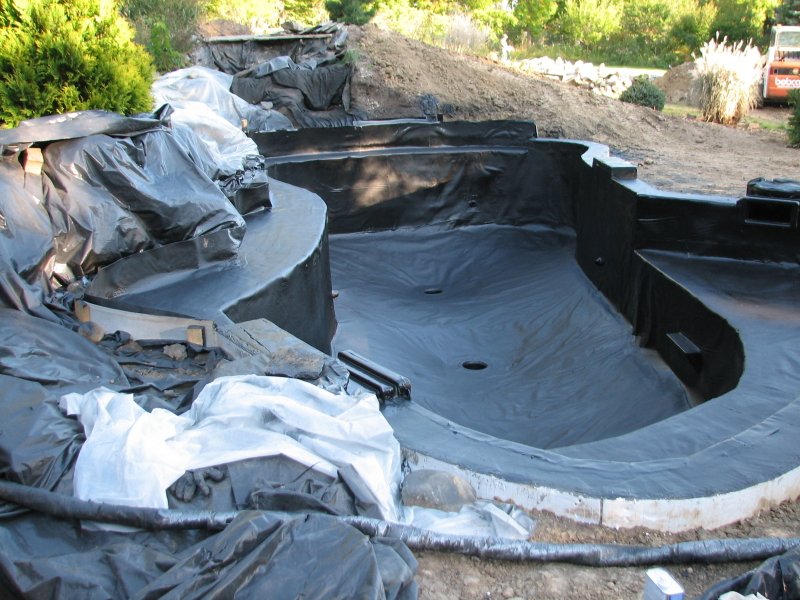Koi Pond Liners




Koi Pond Liners, When it comes to crafting a perfect koi pond, every detail counts—from the placement of stones to the type of water plants you choose. But the true hero of your pond, the unsung protector of your aquatic paradise, is the koi pond liner. Let’s dive into why koi pond liners are essential, how to choose the best one, and what considerations can make or break your koi-keeping experience.
What Is a Koi Pond Liner?
A koi pond liner is the foundation of your pond, designed to create a watertight barrier that keeps water from seeping into the ground. Think of it as your pond’s protective shield, ensuring that your precious koi fish have a stable, secure environment to thrive.
Without a liner, your pond could lose water rapidly, become unstable, or even harm your koi due to exposure to harmful soil elements.
Types of Koi Pond Liners
When it comes to selecting the right liner, there are several options to consider:
1. Flexible Pond Liners
Flexible liners are the most popular choice for koi ponds due to their versatility. They can be shaped to fit almost any pond design, whether you’re going for a natural look or a modern geometric style.
Common materials for flexible liners include:
- EPDM (Ethylene Propylene Diene Monomer): Durable, UV-resistant, and fish-safe. It’s a top choice for koi ponds.
- PVC (Polyvinyl Chloride): Budget-friendly but less durable than EPDM.
- HDPE (High-Density Polyethylene): Lightweight and strong, but it requires careful installation to prevent damage.
2. Preformed Pond Liners
Made from rigid materials like plastic or fiberglass, these liners come in pre-molded shapes. They’re perfect for smaller ponds or beginners who want an easy setup. However, they’re less customizable than flexible liners.
3. Concrete Liners
For those seeking a permanent solution, concrete can be used as a liner. While incredibly durable, concrete ponds are labor-intensive to construct and often require a sealant to ensure they are fish-safe.
How to Choose the Best Koi Pond Liner
Selecting the right koi pond liner involves more than just picking the material. Consider the following factors:
1. Pond Size and Depth
Your liner should accommodate the full size and depth of your pond, plus extra material for edging.
2. Durability
Opt for a liner that can withstand weather fluctuations, UV exposure, and potential punctures. EPDM liners are a solid choice for long-term durability.
3. Fish Safety
Make sure the liner is free of harmful chemicals or additives that could harm your koi. Look for liners labeled as “fish-safe.”
4. Ease of Installation
Some liners, like preformed or HDPE options, are easier to install, while flexible liners may require more effort but offer greater customization.
Installing a Koi Pond Liner: Step-by-Step
- Prepare the Pond Area
- Excavate your pond to the desired shape and depth.
- Remove sharp rocks, roots, and debris that could puncture the liner.
- Add a Protective Underlayment
- Lay down a pond underlayment to cushion the liner and protect it from damage.
- Position the Liner
- Gently unfold and position the liner over the pond area. Leave extra material around the edges for adjustments.
- Fill the Pond with Water
- Slowly fill the pond with water, adjusting the liner as needed to ensure a snug fit.
- Secure the Edges
- Tuck and anchor the liner edges with stones, soil, or decorative features.
Benefits of Using a Quality Koi Pond Liner
- Water Retention: Prevents leaks and ensures consistent water levels.
- Koi Protection: Creates a safe, toxin-free environment.
- Design Flexibility: Enables unique and creative pond shapes.
- Longevity: A durable liner can last for decades with proper care.
Maintaining Your Koi Pond Liner
To ensure your liner lasts for years:
- Regularly inspect for tears or punctures.
- Clean debris and algae buildup to prevent wear.
- Avoid dragging sharp objects or heavy equipment over the liner.
FAQs About Koi Pond Liners
1. What is the best material for koi pond liners?
EPDM is often considered the best material due to its durability, UV resistance, and flexibility.
2. How long do pond liners last?
A high-quality liner, such as EPDM, can last 20–30 years with proper maintenance.
3. Can I install a pond liner myself?
Yes, installing a pond liner is a DIY-friendly project, especially with flexible liners. However, professional help may be needed for larger or more complex ponds.
4. What size pond liner do I need?
Calculate the liner size by adding twice the pond depth to the length and width of your pond, plus extra material for overlap.
5. Are all pond liners fish-safe?
Not all liners are fish-safe. Always check product specifications to ensure the liner is non-toxic and koi-friendly.
You may also like
- https://giobelkoicenter.com/small-koi-pond-a-comprehensive-guide/
- https://giobelkoicenter.com/diy-koi-pond/
- https://giobelkoicenter.com/koi-fish-garden/
- https://giobelkoicenter.com/koi-fish-tee/
- https://giobelkoicenter.com/koi-fish-flags/
- https://giobelkoicenter.com/how-to-start-a-koi-pond-a-comprehensive-guide/
Table of Contents
Passionate about fish keeping since elementary school in the 1980s, Giovanni Carlo has dedicated countless hours to collecting and breeding a diverse array of ornamental freshwater fish. From vibrant guppies and majestic koi to striking bettas and classic goldfish, he continues to explore the fascinating world of aquatics, sharing knowledge and enthusiasm with fellow fish enthusiasts.
